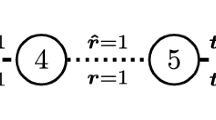Abstract
In fire fighting, time and effort required to control a fire increase if the beginning of the fire containment effort is delayed. The problem of scheduling a single fire fighting resource when there are N ≥ 2 fires to be controlled may be tackled using the concept of deteriorating jobs for the time needed for fire suppression. This paper considers the problem in the case where set-up times are incorporated. The objective is to maximize the total value of the burnt areas remaining after the completion of the containment operation. A branch and bound algorithm is presented, using heuristic algorithms to obtain the upper bound and an initial lower bound. A dominance rule is also applied to reduce the time required for exploring the solution space.


Similar content being viewed by others
References
Alidaee B, Womer NK (1999) Scheduling with time dependent processing times: review and extensions. J Oper Res Soc 50:711–720
Andrews PL (1986) BEHAVE: fire behavior prediction and fuel modeling system—BURN subsystem, part 1. USDA For. Serv. Gen. Tech. Rep. INT-194
Bertsimas D, Tsitsiklis JN (1997) Introduction to linear optimization. MIT, Athena Scientific, USA
Burgan RE, Rothermel RC (1984) BEHAVE: fire behavior prediction and fuel modeling system—FUEL subsystem. USDA For. Serv. Gen. Tech. Rep. INT-167
Buyukkoc C, Varaiya P, Walrand J (1985) The cμ rule revisited. Adv Appl Probab 17:237–238
Cheng TCE, Ding Q, Lin BMT (2004) A concise survey with time dependent processing times. Eur J Oper Res 152:1–13
Dimopoulou M, Giannikos I (2001) Spatial optimization of resources deployment for forest fire management. Int Trans Oper Res 8:523–534
Dimopoulou M, Giannikos I (2004) Towards an integrated framework for forest fire control. Eur J Oper Res 152(2):476–486
Gupta SK, Kunnathur AK, Dandapani K (1987) Optimal repayment policies for multiple loans. OMEGA 15:323–330
Hsu YS, Lin BMT (2003) Minimization of maximum lateness under linear deterioration. OMEGA 31:459–469
Inderfurth K, Lindner G, Rachaniotis NP (2005) Lot sizing in a production system with rework and product deterioration. Int J Prod Res 43(7):1355–1374
Jeng AAK, Lin BMT (2004) Makespan minimization in single-machine scheduling with step-deterioration of processing times. J Oper Res Soc 55:247–256
Jeng AAK, Lin BMT (2005) Minimizing the total completion time in single-machine scheduling with step-deteriorating jobs. Comput Oper Res 32(3):521–536
Kailidis D, Karanikola P (2004) Forest fires 1900–2000. Yahoudi Publications, Greece (in Greek)
Karanikola P, Tampakis S, Tampakis B, Karantoni M (2006) Forest fires in the islands of Northern Sporades during the years 1965–2004. In: Proceedings of the 1st International Scientific Congress of the Department of Forestry and Management of the Environment And Natural Resources of the Democritus University of Thrace, “Sustainable Management and Development of Mountainous and Island Areas”, Naxos and Koronos 29/09-01/10, vol 1, pp 196–204
Kubiak W, van de Velde SL (1998) Scheduling deteriorating jobs to minimize makespan. Nav Res Logist 45:511–523
Kunnathur AS, Gupta SK (1990) Minimizing the makespan with late start penalties added to processing times in a single facility scheduling problem. Eur J Oper Res 47:56–64
Martell DL (1982) A review of operational research studies in forest fire management. Can J For Res 12:119–140
Martell DL, Drysdale RJ, Doan GE, Boychuk D (1984) An evaluation of forest fire initial attack resources. Interfaces 14(5):20–32
Martell DL, Gunn EA, Weintraub A (1998) Forest management challenges for operational researchers. Eur J Oper Res 104:1–17
McAlpine RS, Wakimoto RH (1991) The acceleration of fire from point source to equilibrium spread. For Sci 37(5):1314–1317
McAlpine RS, Xanthopoulos G (1989) Predicted vs. observed fire spread rates in ponderosa pine fuel beds: a test of American and Canadian systems. In: Proceedings of the 10th conference on fire and forest meteorology, Canada, pp 287–294
Omi P (2005) forest fires: a reference handbook. ABC-CLIO Publications, USA
Rachaniotis NP, Pappis CP (2006) Scheduling fire fighting tasks using the concept of “deteriorating jobs”. Can J For Res 36(3):652–658
Rinnooy Kan AHG (1976) Machine scheduling problems. Classification, complexity and computations. Martinus Nijhoff, The Hague
Tampakis S, Papageorgiou A, Karanikola P, Arabatzis G, Tsantopoulos G (2005) The forest fires in the Mediterranean from a policy point of view. New Mediterr J Econ Agric Environ 3:47–51
Voutsinas TG, Pappis CP (2002) Scheduling jobs with values exponentially deteriorating over time. Int J Prod Econ 79(3):163–169
Voutsinas TG, Pappis CP (2009) A branch and bound algorithm for single machine scheduling with deteriorating values of jobs. Math Comput Model (accepted)
Author information
Authors and Affiliations
Corresponding author
Rights and permissions
About this article
Cite this article
Pappis, C.P., Rachaniotis, N.P. Scheduling a single fire fighting resource with deteriorating fire suppression times and set-up times. Oper Res Int J 10, 27–42 (2010). https://doi.org/10.1007/s12351-009-0038-6
Received:
Revised:
Accepted:
Published:
Issue Date:
DOI: https://doi.org/10.1007/s12351-009-0038-6




